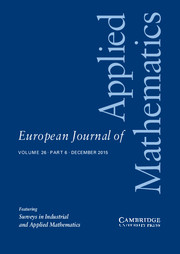Crossref Citations
This article has been cited by the following publications. This list is generated based on data provided by
Crossref.
Fandel, G.
and
Trockel, J.
2013.
Avoiding non-optimal management decisions by applying a three-person inspection game.
European Journal of Operational Research,
Vol. 226,
Issue. 1,
p.
85.
Trockel, Jan
2013.
Changing bonuses and the resulting effects of employees’ incentives to an inspection game.
Journal of Business Economics,
Vol. 83,
Issue. 7,
p.
759.
Avenhaus, Rudolf
and
Krieger, Thomas
2013.
Distributing inspections in space and time – Proposed solution of a difficult problem.
European Journal of Operational Research,
Vol. 231,
Issue. 3,
p.
712.
Fandel, G.
and
Trockel, J.
2014.
The influence of mutations: an evolutionary inspection game with three strategic actors.
Journal of Business Economics,
Vol. 84,
Issue. 7,
p.
959.
Kolokoltsov, Vassili
2017.
The Evolutionary Game of Pressure (or Interference), Resistance and Collaboration.
Mathematics of Operations Research,
Vol. 42,
Issue. 4,
p.
915.
Siggelkow, Benjamin Florian
Trockel, Jan
and
Dieterle, Oliver
2018.
An inspection game of internal audit and the influence of whistle-blowing.
Journal of Business Economics,
Vol. 88,
Issue. 7-8,
p.
883.
Rauhut, Heiko
2018.
Spieltheoretische Modelle und Experimente zur Erklärung von Kriminalität.
Monatsschrift für Kriminologie und Strafrechtsreform,
Vol. 101,
Issue. 3-4,
p.
272.
Carboni, Oliviero A.
and
Russu, Paolo
2021.
Taxation, Corruption and Punishment: Integrating Evolutionary Game into the Optimal Control of Government Policy.
International Game Theory Review,
Vol. 23,
Issue. 02,
p.
2050019.
Gambarelli, Gianfranco
Gervasio, Daniele
Maggioni, Francesca
and
Faccini, Daniel
2022.
A Stackelberg game for the Italian tax evasion problem.
Computational Management Science,
Vol. 19,
Issue. 2,
p.
295.
Villani, Giovanni
and
Biancardi, Marta
2023.
An Evolutionary Game to Study Banks–Firms Relationship: Monitoring Intensity and Private Benefit.
Computational Economics,
Vol. 61,
Issue. 3,
p.
1075.




